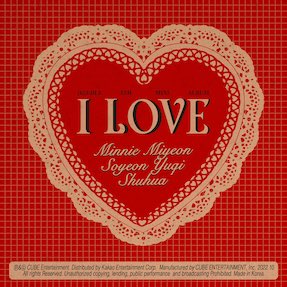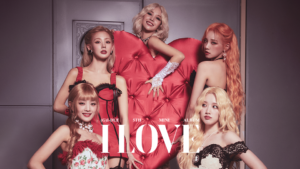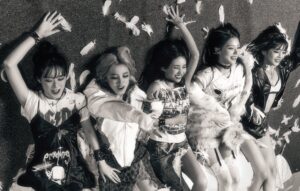
2022 has been a tremendous year for (G)I-dle, with their first album, I Never Die, bringing the quintet to new heights both critically and commercially. Rather than rest on their laurels or double down on the pop punk image that brought them such success, (G)I-dle have chosen to pivot about as far from the fierce independence of their last release as possible. Instead, their newest EP, I Love, takes a look at many facets of romantic relationships. That does not mean they have lost their bite, wit, or insight. I Love is a stark reminder that sometimes, love is not patient or kind, but the single most destructive force known to woman.
Opening with “Nxde”, (G)I-dle starts by examining not a personal love, but the love directed at public figures and the sense of ownership an audience often claims over the performer. The song carries a strong circus vibe; (G)I-dle are not performers but sinister, malevolent ringmasters. The strings are highly theatrical, but they sound just a hair off-key and off-kilter, giving an unsettling edge to the track. (G)I-dle are smug as they dismiss the demands lobbied at them, to show more or less skin, and to fulfill the audience’s desires rather than their own. But because this is their show, the behavior is ignored and called out for what it is: rude. No one exists to please others, and that does include idols.
“Love” is the other smug track on I Love. A post-breakup track, “Love” is both the calmest track, and the one with the strongest punk vibe, thanks to a crunchy guitar lick and mostly organic instrumentation. Of course, it is easy to be calm when you won the breakup. “Love” is a celebration of (G)I-dle’s current position on top of the world, and they have no qualms about thanking the trash for taking itself out. Sardonic and sarcastic, “Love” is the embodiment of revenge by living well, showing (G)I-dle focusing on themselves and their career as they savor their success. Yet, the bridge shows a glimmer of vulnerability, where they admit to keeping people out to ensure they don’t get hurt again.
Things take a turn for the dark with “Change”. This is where Minnie and Yuqi’s contributions start to appear, deviating from the brashness that is Soyeon’s signature into something more vulnerable. I Love shifts from (G)I-dle being in control to being at the mercy of their own emotions, driven to desperate actions out of a need to be loved.

“Change” is the album standout, acting as the dark mirror of “Love”. Here, the reality of fame has set in–that it doesn’t mean much, and it will not last. The pre-chorus is devastating– a Yuqi and Miyeon tag-team, using their lower registers to add a haunting quality as they admit that fame and fans are not enough to sustain someone emotionally. This is compounded by the sharp knowledge that nothing lasts forever, and one day even this love will be gone. Paired with an aggressive beat, the quiet and quick delivery creates an air that is melancholy and terror-stricken. Caught up in the fears of it ending and having no one there anymore, (G)I-dle are no longer able to enjoy their success.
“Reset” is slow and mournful but sweet, focusing on the personal recovery after a long-term relationship comes to an end, as well as making some painful realizations about yourself. While (G)I-dle attempt to focus on themselves in the aftermath, it reveals a self-sacrificial streak. They attempt to reset themselves and learn to see the positives in being single–you can spoil yourself, see some old friends, enjoy the attention of other men–but they ultimately cannot. The warm guitar and gooey instrumentation comes to an abrupt end as (G)I-dle come to the conclusion that they’d still prefer to be in a relationship and want to jump straight into a new one.

That impulse makes the already unnerving “Sculpture” downright depressing. “Sculpture” draws heavily from the myth of Galatea and Pygmalion. Pygmalion was an artist who created a sculpture of the perfect woman, and immediately fell in love with it due to its perfection, prompting Aphrodite to bring it to life. Here, (G)I-dle becoming willing Galateas, molding themselves to fit their partners’ needs and desires in a desperate bid to not be left behind again. And even as it’s clear this does not work, as they admit their own unhappiness and the cracks in the facade, they refuse to give up, stating that it’s easier to lose themselves than their partner.
The instrumentals only amp up the sense of a morbid and futile performance. The cadence of the chorus has a very musical theater sound, evoking chorus girls doing kicklines, i.e. idealized women molded to an image. The vocals are sincere, but laced with anguish, as (G)I-dle realize that trying to become someone’s perfect woman at the cost of yourself is simply not sustainable, but they fling themselves further into denial. They will not lose another relationship, no matter what it takes.

This brings things to a head on “Dark (X-file)”. Love has fully corrupted (G)I-dle, turning them from independent women to codependent messes to sinister gaslighters. It is disconcerting in its softness and gentle instrumentation, the warped synths and minor keys highlighting the amorality they have embraced. It is someone whispering soft and sweet in your ear, hoping the tone disguises the toxicity of the words themselves. Moreover, (G)I-dle are completely cognizant of their actions, but just do not care about how bad they are, as long as it means keeping their relationship.
Love is usually framed as a positive. It is sweet, inspiring, confidence-building; the ways love can improve one’s life are many. But love has as many negative facets as positive ones. It can be obsessive, isolating, demoralizing, controlling, self-destroying, or soul-ruining by its presence or absence. And in a society that pushes young women to value romantic love above anything, (G)I-dle and I Love make clear just how bad love can go.
(YouTube, Images via Cube Entertainment)


